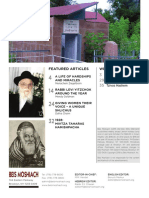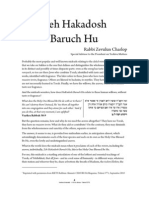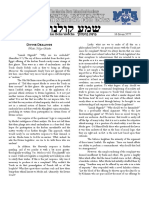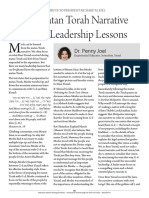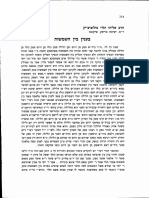The Holy of Holies: Rabbi David Milston
Uploaded by
outdash2The Holy of Holies: Rabbi David Milston
Uploaded by
outdash2The Holy of Holies
Rabbi David Milston
Midreshet HaRova On the eve of Yom HaZikaron68 2009, at an annual event held at Binyanei HaUma in Yerushalayim, Rabbi Yisrael Meir Lau69 told a story about the late Rabbi Shlomo Zalman Auerbach70: Every day, someone would drive Rabbi Auerbach from his home in the Shaarei Chesed area of Yerushalayim to his Yeshiva in Bayit Vegan. The Rabbi would occasionally ask the driver to pull up for a few moments outside Har Herzl, the burial site of Israel's fallen soldiers, where he would recite Tehillim. Why did he do this? A student once approached him and asked for a timeout from his studies so he could travel north to pray at the graves of the tzaddikim (righteous people). Rabbi Shlomo Zalman looked perplexed but didnt immediately answer. Sensing hesitation from his rabbi, the student elaborated, explaining he had some personal issues to think through and he felt praying by the graves of the righteous would help. Rabbi Auerbach replied that he fully understood what the student wanted to do and why he wanted to do it, but could not understand why he would travel four hours to pray by the graves of a few tzaddikim when there were thousands of them buried on Har Herzl, just five minutes from the yeshiva! It is with such awe and humility that we speak of the holy individuals who have given their lives for the sake of their beliefs and their people. Our rabbis tell us there is a special place reserved in the Heavens for those who give up all they have for the sake of Am Yisrael.71 We remember those who have fallen in the unending battle for our homeland, eternally humbled by their bravery and ever grateful for their sacrifice. It is largely thanks to them that we can visit and live freely in Israel today. We obviously see the hand of the Almighty in the countrys
68 69
The official Remembrance Day for almost 23,000 Israeli soldiers and 4,000 terror victims (at the time of writing.) Former Ashkenazi Chief Rabbi of Israel and current Chief Rabbi of Tel-Aviv. 70 1910-1995. Rabbi Auerbach was the Rosh Yeshiva of Kol Torah in Jerusalem. 71 See Pesachim 50a. Rabbi Yosef the son of Rabbi Yehoshua Ben Levi fell into a trance and visited the afterworld. Upon his return, he reported a number of things to his father. One of the statements he heard there was, No man can stand within the barriers of those martyred by the State. [i.e. They occupy such an exalted position in the next world that they are unapproachable.] Who are these [martyrs]? Shall we say Rabbi Akiva and his companions (who were executed or martyred by the Romans for their insistence on teaching Torah.)? Is that because they were martyrs of the State and nothing else? Rather [he meant] the martyrs of Lod (two brothers, Lulianus and Papus, who took responsibility for the Emperors daughters death so as to save the people as a whole.) See Taanit 18b. 48
Yeshiva University A To-Go Series Iyyar 5772
miraculous establishment and existence but He helps those who help themselves (see Massechet Yoma 38b ; see also Rashi, Mishlei 16:9) So on this solemn day 24 hours before the commencement of the annual national celebrations of our return to Zion we bow our heads in honor of our fallen heroes. Their sacrifice is the purest form of giving that exists. Although during our brief stay in this world we often manage to accumulate wealth and possessions, at least in our sub-conscious we know that none of our material gains remain with us eternally, as King David so poignantly reminds us: Do not fret when a man gains wealth, when the wealth of his house is increased, for when he dies he shall carry nothing away. His wealth shall not go down with him. Tehllim 49:17-18 - , - - , . , - . :-
We leave our possessions behind when we pass on to the next world, indeed even our bodies are not really ours for keeps. When we die, they return to the earth and our soul our only lasting asset is finally free to rise to the Heavens. Genuine giving is giving what is truly ours to give. In Hebrew, the word for charity is tzedaka, a derivate of the word tzedek justice. Charity is not really a kindness of the highest degree; in truth it is to be expected. After all, God gave us all we have so it is not really ours alone. To give charity is the just and correct thing to do; we are expected to share with others that which God has given to us. Chesed is a different matter altogether. Loving kindness is doing above and beyond the expected, it is a pure act of giving an act of love. Our soul, the truest expression of who we are, comes down to earth to define and refine itself. Mesirut nefesh (self-sacrifice) is literally to be understood as voluntarily giving of ourselves, our inner selves, our actual being. Mesirut nefesh is a statement of pure giving for the sake of others and for the sake of God. We receive nothing in return, and our sacrifice is enormous. So when a soldier fighting for the survival of his people, in protection of his comrades or defending the Jewish right to live and believe knowingly hands his soul back to the Creator, it is surely to be considered the truest form of giving, the purest sacrifice. When he puts his country before himself, he emulates the Almighty, the ultimate Giver. No one can equal such a level of giving. He declares himself to be a soul made in the image of God! Perhaps this was what Rabbi Auerbach was referring to when he advised his student to pray by the graves of the soldiers buried on Mount Herzl. These men and women gave the only true thing they own their lives, so we could continue to live in peace in our homeland. Surely the least we can do for these holy people is to dedicate one day a year to their memory! After all, the day was not set aside for their families. They have to bear the loss every day of the year. Yom HaZikaron was established so that we, the entire nation, can express our perpetual gratitude for their everlasting sacrifice.
49
Yeshiva University A To-Go Series Iyyar 5772
It is interesting to note our custom to recite the Yizkor prayer in memory of family members who have passed away on Pesach, Shavuot, Yom Kippur and Shemini Atzeret. Many communities also add memorial prayers for Israeli soldiers and Holocaust victims. Why combine sadness and sorrow with our festive celebrations? One possible reason is that Yizkor allows us to express that eternal void in our lives. Although we have enjoyed our festivals, our celebration will never be the same without our loved ones. However, unlike Yizkor, Yom HaZikaron was not instituted as part of Yom HaAtzmaut but rather as a separate day preceding the Independence celebrations. Even though those who initially established the day may not have had this idea in mind, the differing order of events is more than relevant. Yizkor helps us reflect on the people who are no longer with us, and is thus placed at the conclusion of our festive celebrations. Yom HaZikaron, however is there to remind us that were it not for the grace of Heaven and the sacrifice of our brothers and sisters, Yom HaAtzmaut wouldn't exist at all hence this day of remembrance must precede the celebrations. Anyone who has experienced the twilight zone between Yom HaZikaron and Yom Ha'atzmaut will have noted the mixed emotions as we move from "evel" (mourning) to yom tov" (festivities). Yet these two seemingly opposite days are inextricably connected. You could not have one without the other for this is the destiny of the Jew-destruction and renewal; despair and hope. Because our soldiers fell in defense of the State of Israel, every Jew in the world benefits from their sacrifice. Consequently, no Jew in the world should fail to honor and remember them. Moreover, when the Knesset officially added the memory of Israels terror victims to this day, they issued a fundamental message about Am Yisrael in Eretz Yisrael. Just as Israel could not exist without the heroic dedication of its soldiers, it cannot survive without the stubborn courage of every one of its citizens. Those who have been here for generations and those who have chosen to come home and realize the ultimate Jewish dream of redemption. Those who have left comfortable lives in the Diaspora and those who fled persecution and suffering in Arab lands. They are all Gods soldiers. If every Jew chose to wait in the Diaspora until it was safe to return or until the financial situation improved, we would be sitting in Exile forever. So it is eminently fitting that on a day of remembrance for our fallen soldiers we also pay our respects to the men, women and children who have been brutally deprived of life just because they wanted to be a part of the Jewish dream of Shivat Tzion (return to Zion). To be a Yehudi, to be a Jew, is synonymous with awareness, appreciation and responsibility. The word Yehudi is connected to the word lehodot which means both to give thanks and to admit, to take responsibility. Therefore, before we celebrate our independence and thank God for our country, it is crucial to first take a day to remember, honor and thank those holy souls who took the ultimate responsibility to make it all possible. May their memories be blessed.
50
Yeshiva University A To-Go Series Iyyar 5772
You might also like
- Lessons Learned From Conversion: Rabbi Zvi RommNo ratings yetLessons Learned From Conversion: Rabbi Zvi Romm5 pages
- Creating Our Connection To The Land of Israel: Mrs. Shira SmilesNo ratings yetCreating Our Connection To The Land of Israel: Mrs. Shira Smiles3 pages
- Deep in the Heart: The Groom Who Went to War, Aharon KarovFrom EverandDeep in the Heart: The Groom Who Went to War, Aharon KarovNo ratings yet
- Tisha Bav To-Go - 5770 Rabbi SoloveitchikNo ratings yetTisha Bav To-Go - 5770 Rabbi Soloveitchik9 pages
- The Meaning of Yom Ha'atzmaut: Rabbi Moshe GanzNo ratings yetThe Meaning of Yom Ha'atzmaut: Rabbi Moshe Ganz3 pages
- Rabbi Barclay Israel E-mails From Oct 7, 2023 to Jan 1, 2025No ratings yetRabbi Barclay Israel E-mails From Oct 7, 2023 to Jan 1, 2025841 pages
- Haggadah - Habonim Dror 2012 - Yoreh and HatzavNo ratings yetHaggadah - Habonim Dror 2012 - Yoreh and Hatzav22 pages
- Joy of Yizkor: Rabbi Daniel Lerner, PsydNo ratings yetJoy of Yizkor: Rabbi Daniel Lerner, Psyd4 pages
- Volume XIII Issue 1: "A House of Prayer For All Peoples": Particular and Universal Themes in The Tishrei HolidaysNo ratings yetVolume XIII Issue 1: "A House of Prayer For All Peoples": Particular and Universal Themes in The Tishrei Holidays8 pages
- Simchah Shel Mitzvah: Rabbi Moshe LichtmanNo ratings yetSimchah Shel Mitzvah: Rabbi Moshe Lichtman2 pages
- The War Against the Bible: Ishmael, Esau and Israel at the End TimesFrom EverandThe War Against the Bible: Ishmael, Esau and Israel at the End TimesNo ratings yet
- Israel's New Disciples: Why are so many Jews turning to Jesus?From EverandIsrael's New Disciples: Why are so many Jews turning to Jesus?No ratings yet
- The Drama of Tashlich: This Issue of Toronto Torah Is Sponsored by Nathan Kirsh in Loving Memory of His Parents andNo ratings yetThe Drama of Tashlich: This Issue of Toronto Torah Is Sponsored by Nathan Kirsh in Loving Memory of His Parents and4 pages
- Exile and Redemption in Tanach and Jewish History100% (1)Exile and Redemption in Tanach and Jewish History37 pages
- Our Dependence Upon Israel's Independence: Rabbi Norman LammNo ratings yetOur Dependence Upon Israel's Independence: Rabbi Norman Lamm5 pages
- Israeli Documentary Remembers Jerusalem Saint - ArticleNo ratings yetIsraeli Documentary Remembers Jerusalem Saint - Article3 pages
- Likutei Ohr: The Process of Spiritual GrowthNo ratings yetLikutei Ohr: The Process of Spiritual Growth2 pages
- Zeh Hakadosh Baruch Hu: Rabbi Zevulun CharlopNo ratings yetZeh Hakadosh Baruch Hu: Rabbi Zevulun Charlop6 pages
- Staking Our Claim To The Land: Rabbi Moshe Chaim SosevskyNo ratings yetStaking Our Claim To The Land: Rabbi Moshe Chaim Sosevsky3 pages
- Sukkot Seven Prophetic Blessings August 23 2021 Broaike0% (1)Sukkot Seven Prophetic Blessings August 23 2021 Broaike129 pages
- J Street Passover 2012 Print Double Sided Short EdgeNo ratings yetJ Street Passover 2012 Print Double Sided Short Edge2 pages
- The Surrogate Challenge: Rabbi Eli BelizonNo ratings yetThe Surrogate Challenge: Rabbi Eli Belizon3 pages
- Flowers and Trees in Shul On Shavuot: Rabbi Ezra SchwartzNo ratings yetFlowers and Trees in Shul On Shavuot: Rabbi Ezra Schwartz2 pages
- The Meaning of The Menorah: Complete Tanach)No ratings yetThe Meaning of The Menorah: Complete Tanach)4 pages
- The Matan Torah Narrative and Its Leadership Lessons: Dr. Penny JoelNo ratings yetThe Matan Torah Narrative and Its Leadership Lessons: Dr. Penny Joel2 pages
- Consent and Coercion at Sinai: Rabbi Dr. Jacob J. SchacterNo ratings yetConsent and Coercion at Sinai: Rabbi Dr. Jacob J. Schacter3 pages
- Performance of Mitzvos by Conversion Candidates: Rabbi Michoel ZylbermanNo ratings yetPerformance of Mitzvos by Conversion Candidates: Rabbi Michoel Zylberman6 pages
- Shavuot To-Go - 5777 Mrs Schechter - Qq4422a83lNo ratings yetShavuot To-Go - 5777 Mrs Schechter - Qq4422a83l2 pages
- I Just Want To Drink My Tea: Mrs. Leah NagarpowersNo ratings yetI Just Want To Drink My Tea: Mrs. Leah Nagarpowers2 pages
- Reflections On A Presidential Chavrusa: Lessons From The Fourth Perek of BrachosNo ratings yetReflections On A Presidential Chavrusa: Lessons From The Fourth Perek of Brachos3 pages
- Lessons From Mount Sinai:: The Interplay Between Halacha and Humanity in The Gerus ProcessNo ratings yetLessons From Mount Sinai:: The Interplay Between Halacha and Humanity in The Gerus Process3 pages
- What Happens in Heaven... Stays in Heaven: Rabbi Dr. Avery JoelNo ratings yetWhat Happens in Heaven... Stays in Heaven: Rabbi Dr. Avery Joel3 pages
- Why Israel Matters: Ramban and The Uniqueness of The Land of IsraelNo ratings yetWhy Israel Matters: Ramban and The Uniqueness of The Land of Israel5 pages
- Kabbalat Hatorah:A Tribute To President Richard & Dr. Esther JoelNo ratings yetKabbalat Hatorah:A Tribute To President Richard & Dr. Esther Joel2 pages
- Experiencing The Silence of Sinai: Rabbi Menachem PennerNo ratings yetExperiencing The Silence of Sinai: Rabbi Menachem Penner3 pages
- Chag Hasemikhah Remarks, 5777: President Richard M. JoelNo ratings yetChag Hasemikhah Remarks, 5777: President Richard M. Joel2 pages
- José Faur: Modern Judaism, Vol. 12, No. 1. (Feb., 1992), Pp. 23-37No ratings yetJosé Faur: Modern Judaism, Vol. 12, No. 1. (Feb., 1992), Pp. 23-3716 pages












